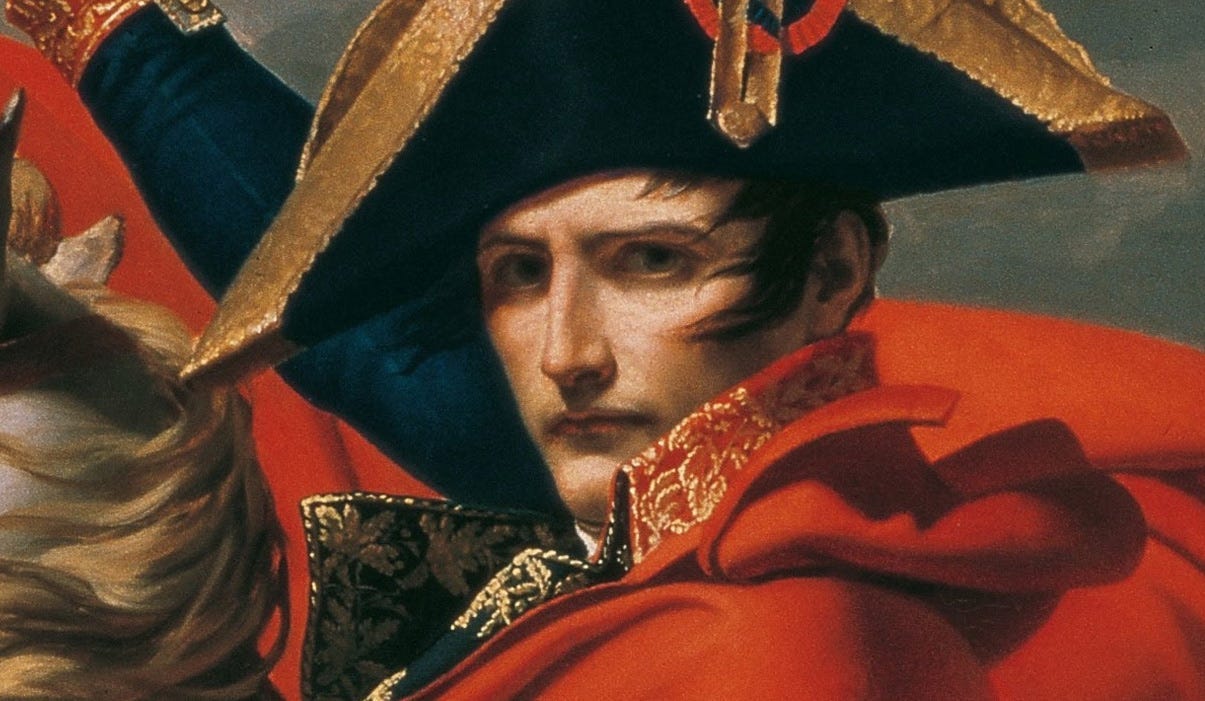My New Book—Napoleon: The Revolutionary Hero—is OUT NOW!!! Check it out on Amazon:
Napoleon Bonaparte was a genius. But was there a secret to his brilliance? Can we apply his skills to our own lives?
Yes, we can.
Robert Greene is the famous best-selling author of The 48 Laws of Power. Greene praises Napoleon as “the Mozart of warfare.”
Here are five secrets behind Napoleon’s genius, as told by Robert Greene.
1- Don’t be a control freak
You might imagine Napoleon as a control freak, an angry short guy barking orders at his men. But nothing could be further from the truth!
Unlike most people, Napoleon was not obsessed with controlling destiny. To him, it was always impossible to predict life’s outcomes. “I never was truly my own master,” he tells us, “but was always ruled by circumstances.”
Again, Napoleon was not a control freak! He did not micromanage his troops. Quite the opposite: he trusted his men to get the job done. Using his flexible corps system, Bonaparte allowed his subordinates to make most of the decisions on the fly, freely adjusting the strategy as needed.
2- Be flexible
Flexibility was the key to Napoleon’s success.
Today’s CEOs and business leaders try to control everything. But according to Greene, that’s not how Napoleon did things.
Instead, Napoleon created a system within his army, which allowed the French troops to immediately respond to a crisis without seeking his permission. In other words, Bonaparte’s innovative corps system was flexible. The French troops could switch strategies at the drop of a hat, unlike their rigid enemies.
Greene calls this “controlled chaos.” Ever the brilliant general, Napoleon always anticipated a certain level of unpredictability. Rather than rigidly sticking to a plan, Napoleon had a system in place to make on-the-job changes.
According to Greene, Napoleon’s downfall came after he started to micromanage his men. When he invaded Spain, Bonaparte tried to overpower his enemy through brute force, rather than outmaneuvering the enemy—as the younger Napoleon would have done. This was a terrible strategy, and the Spaniards wore down the French occupation using guerrilla tactics. Not unlike America’s invasion of Afghanistan, which similarly ended in disaster. Napoleon made a similar mistake to invade Russia. Finally, he was defeated at Waterloo.
For Greene, Napoleon’s story represents an essential theme: We must always be flexible. The rise to power always begins with creativity, when you allow chaos to enter your life. But with some success and power, you get a conservative instinct that will ultimately destroy you—just like it did to Napoleon!
3- Be bold
“He who fears being conquered is certain of defeat,” Napoleon tells us.
Napoleon wasn’t born rich or famous. The French Revolution challenged the traditional aristocracy, allowing outsiders to climb the ranks through their own merits. A poor boy from Corsica, he quickly rose through the ranks of French military. Why? Because he was daringly bold. The endlessly ambitious young man demanded for opportunities to advance socially—and that’s what he got! Ask, and you shall receive.
Every problem he faced, Napoleon did so with boldness. He courageously led his men on the battlefield, always accepting the grim possibility that he might die or be wounded.
4- Be creative
Most people are boring and bland. They are average and conformist. They have no spirit, no drama. They just want to follow the herd. But not our Napoleon, who was one of a kind!
Napoleon’s creativity knew no boundaries. He was never afraid to propose new ideas, or challenge “accepted” ways of doing things. He didn’t try to be like anybody else. He chased his own destiny, not somebody else’s dreams.
5- Pay attention to details
Napoleon had a special power: he paid attention to every single detail. Every. Single. Detail.
A gifted leader, Bonaparte could effortlessly organize his men. His brain could retain lots of information, just like a computer.
Before going into battle, Napoleon studied every single detail of what might happen. He loved to look over maps. He knew everything about the enemy, including their politics and economy.
To make his decisions, General Bonaparte relied on a vast network of communication. His lieutenants gave him minute-by-minute coverage of the battle.






Nice! The first two are basically Invisible Hand strategies. You can be as smart as Castro and still incapable of figuring out what's best for every individual. And the final secret on this list: a hint of autism.
Clearly I am destined to take over Europe.